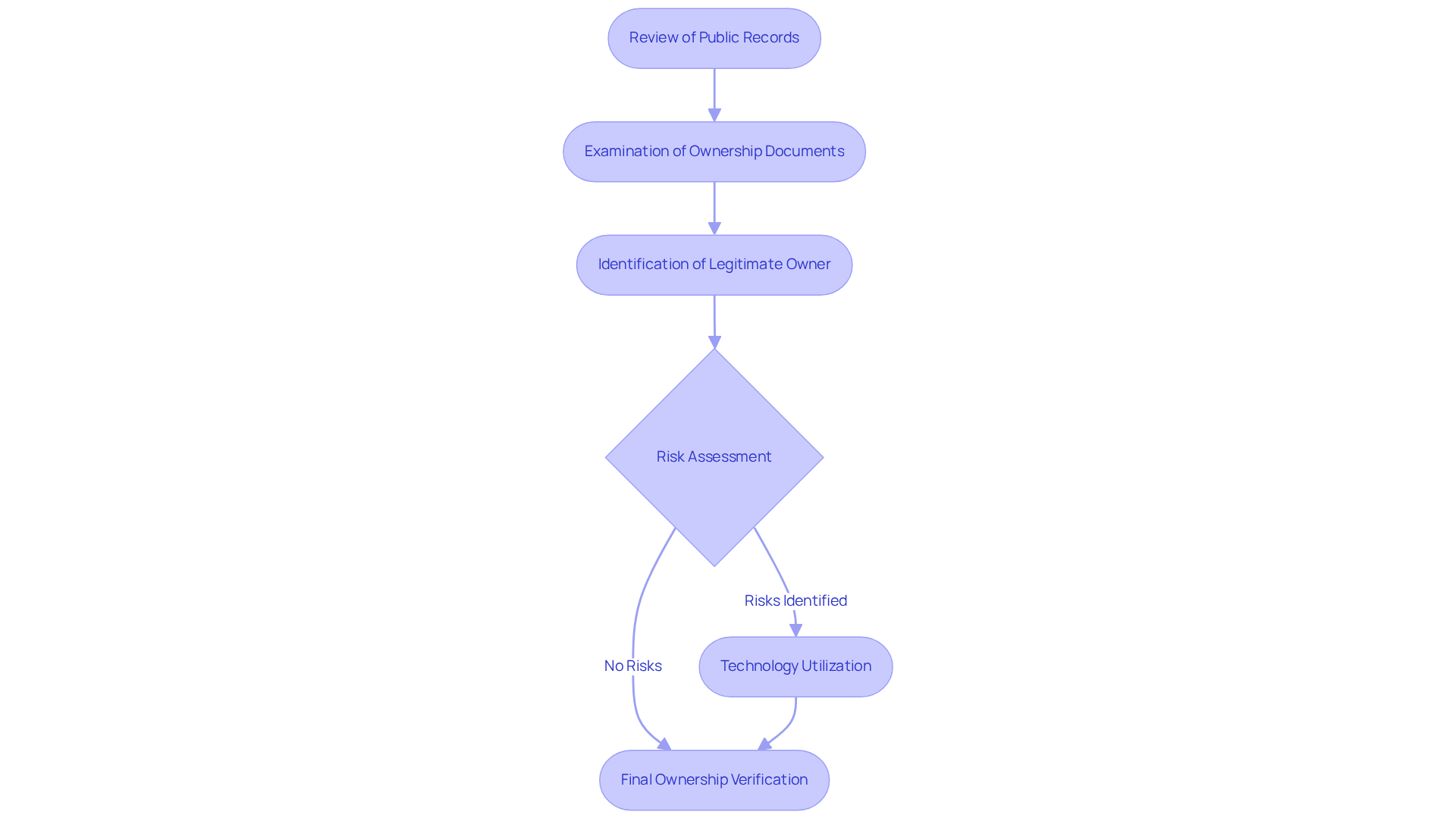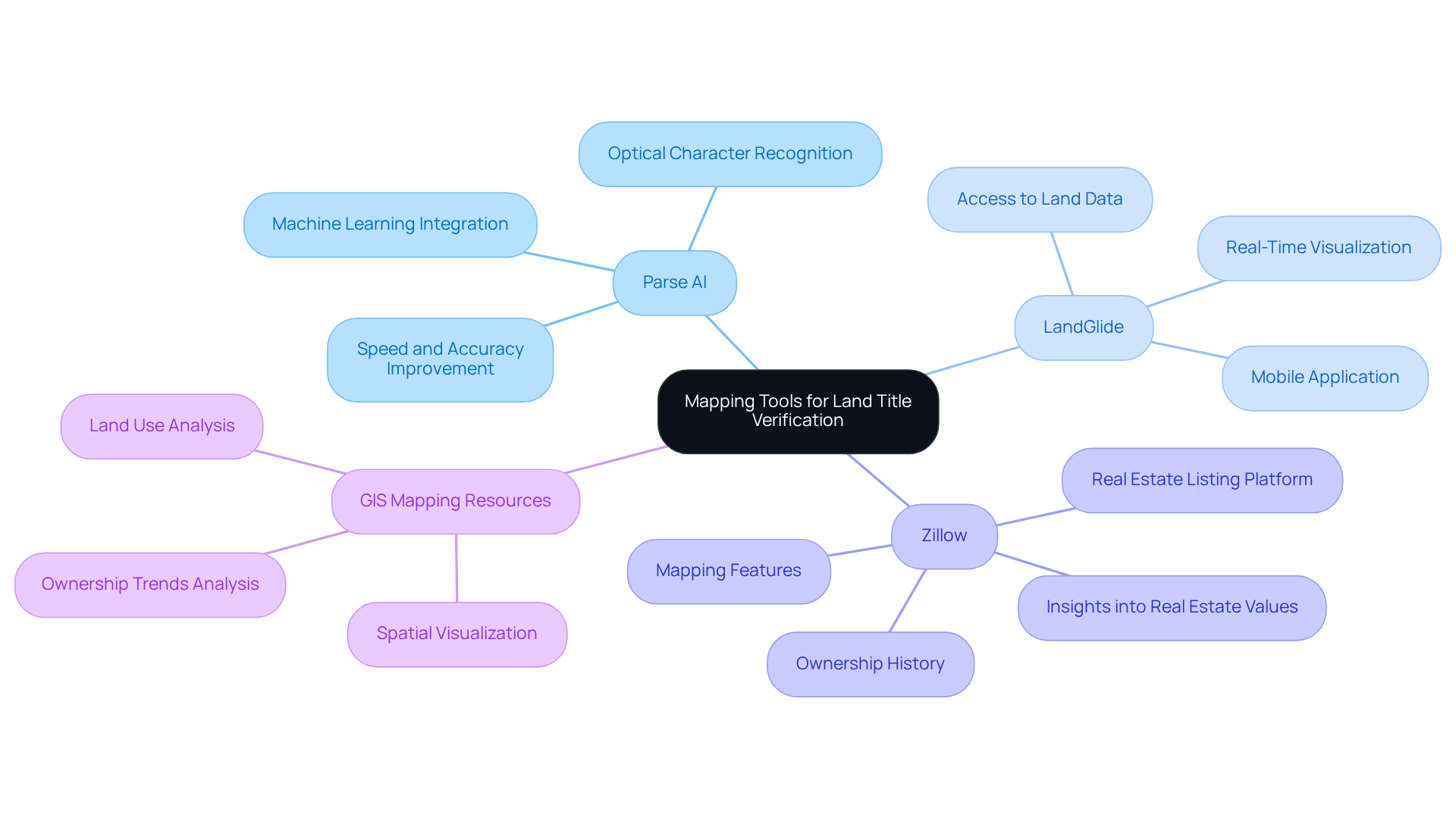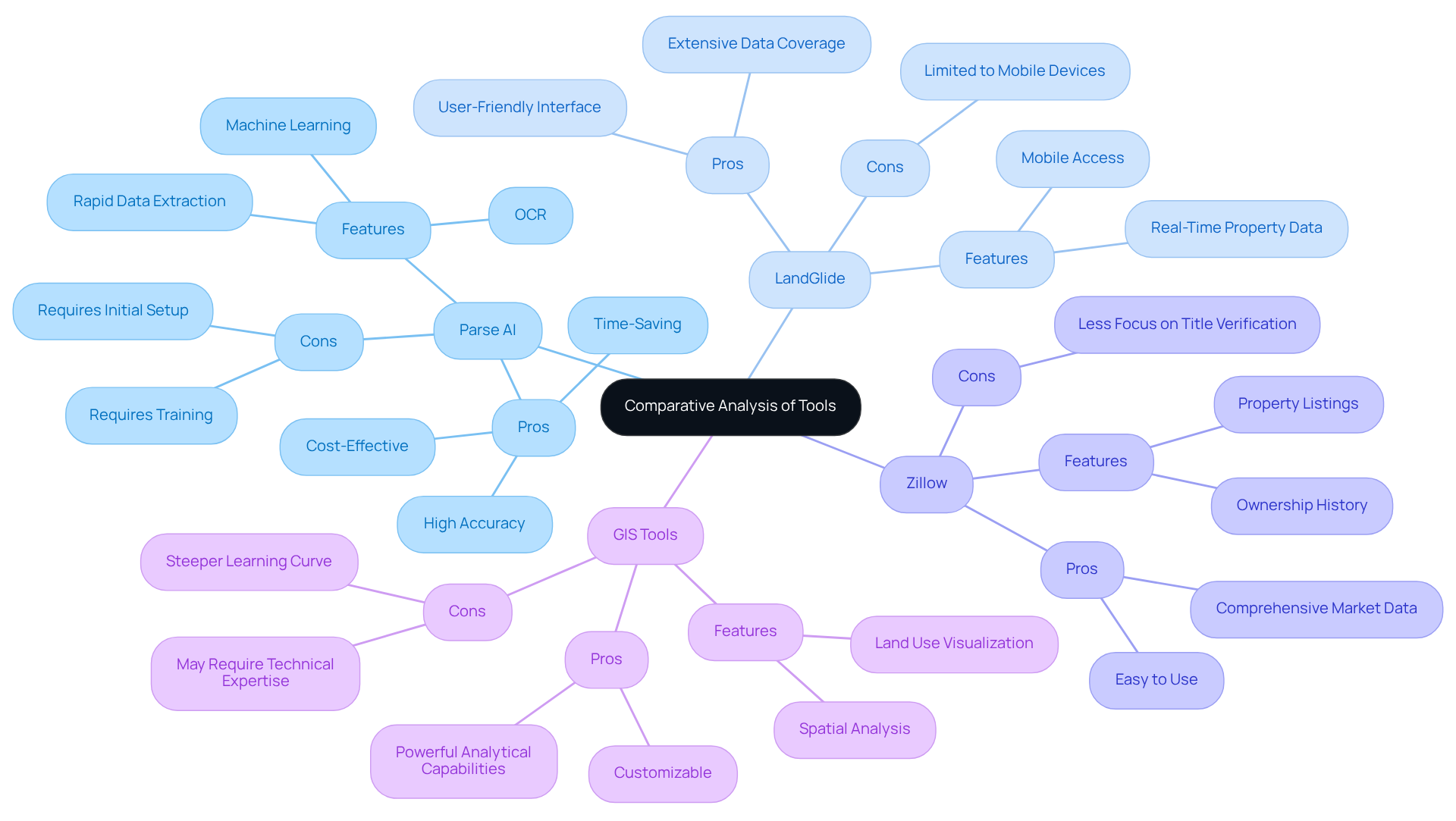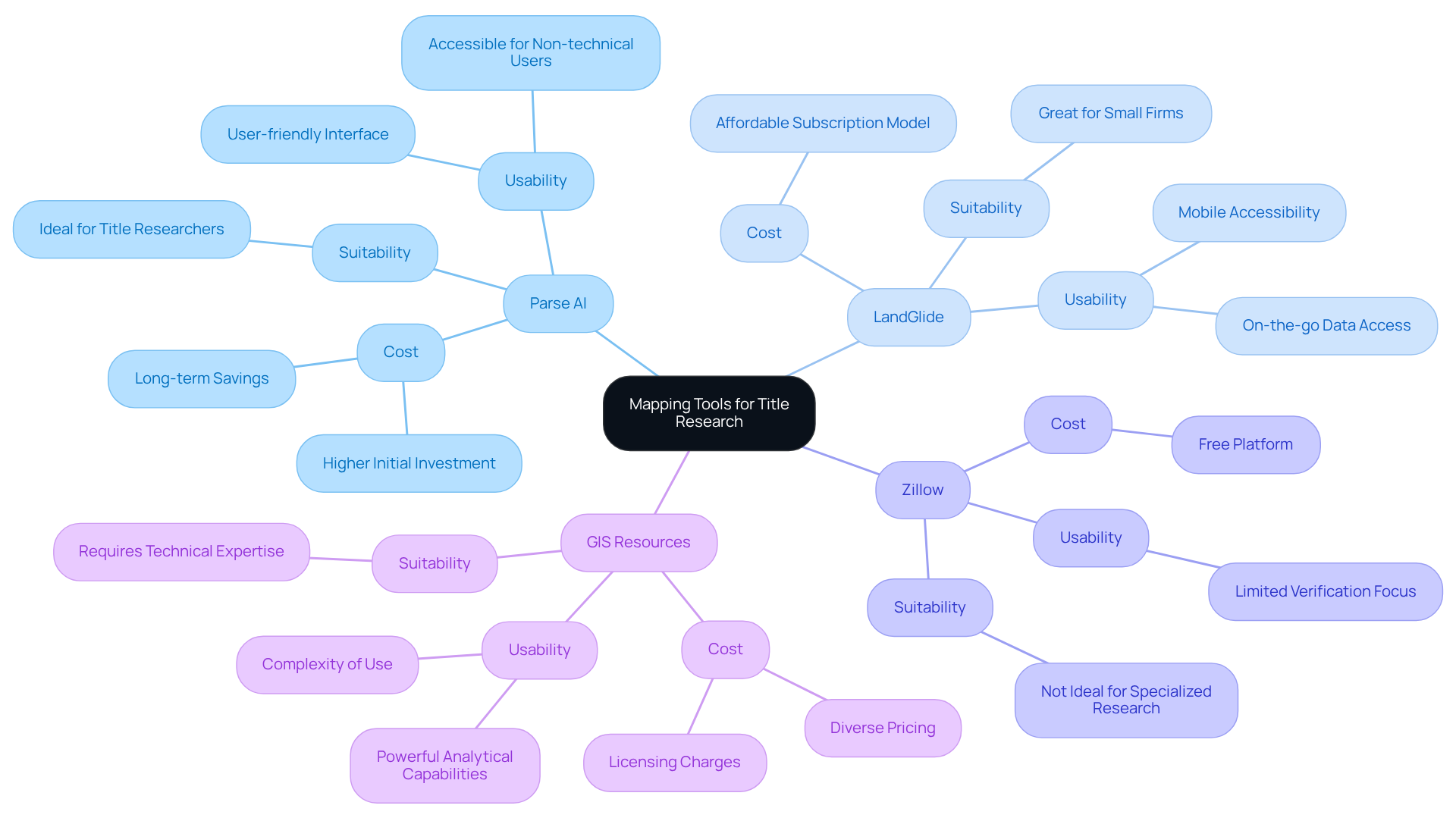Overview
The article examines four essential mapping tools for land title verification, underscoring their features and costs to aid real estate professionals in selecting the most appropriate option. By evaluating tools such as Parse AI, LandGlide, Zillow, and GIS resources, the article accentuates the critical role of accuracy and usability in title research. Each tool is discussed in the context of how it addresses specific challenges in the verification process, ultimately reinforcing the necessity of reliable solutions in this domain.
Introduction
Land ownership verification serves as a cornerstone of real estate transactions, safeguarding buyers from potential legal disputes and financial pitfalls. With the increasing demand for accurate and efficient title research, real estate professionals are turning to advanced mapping tools designed to streamline this intricate process. However, given the multitude of options available, how can one ascertain which tool best aligns with their specific needs? This article embarks on a comparative analysis of four leading mapping tools for land title verification, examining their features, costs, and the unique advantages they present to enhance the verification process.
Understanding Land Title Verification and Its Importance
Land ownership verification is a critical procedure in real estate dealings, confirming the validity of asset ownership and ensuring it is free from conflicts. This process involves a thorough review of public records, ownership documents, and other legal instruments to identify the legitimate owner of a real estate asset.
As noted by the American Bar Association, "A property search is a crucial step in the real estate transaction process, as it helps to identify potential risks and issues that may affect the buyer's ownership of the asset." The importance of precise document authentication cannot be overstated; it protects buyers from potential legal complications, such as claims from former proprietors or undisclosed liens, including common issues like unknown heirs and outstanding debts.
Furthermore, effective document validation can significantly reduce the time and expenses associated with real estate transactions, making it essential for real estate professionals to utilize efficient mapping tools that streamline this process. The duration of a property ownership search can vary, typically requiring several days to several weeks to complete, depending on the region and complexity of the search.
As the industry evolves, leveraging technology such as machine learning and optical character recognition becomes increasingly vital in enhancing the accuracy and speed of document verification. However, it is crucial to recognize that while a document search greatly mitigates the risk of unknown issues, it does not guarantee clear ownership.
Adhering to best practices for seamless property transactions—such as conducting comprehensive ownership searches and collaborating with stakeholders—is essential for minimizing risks and achieving successful outcomes.

Overview of Top Mapping Tools for Land Title Verification
In the realm of land ownership verification, several mapping tools for land title verification have emerged as leaders in the industry, each offering distinctive features tailored to the needs of researchers. The significance of accurate title research cannot be overstated, as it forms the foundation of real estate transactions. However, professionals often face challenges in obtaining reliable data. Fortunately, innovative solutions such as mapping tools for land title verification have surfaced to address these challenges effectively.
- Parse AI: Leveraging machine learning and optical character recognition, Parse AI swiftly extracts critical information from title documents, markedly improving the speed and accuracy of title research.
- LandGlide: This mobile application grants users access to land data and mapping resources, allowing for real-time visualization of boundaries and ownership details.
- Zillow: Primarily recognized as a real estate listing platform, Zillow also offers mapping features that provide insights into real estate values and ownership history.
- GIS Mapping Resources: Geographic Information Systems (GIS) resources empower users to visualize land data spatially, facilitating the analysis of land use and ownership trends.
Each of these mapping tools for land title verification plays a vital role in the document authentication process, offering diverse capabilities that cater to the varied requirements of real estate professionals. Consequently, by integrating these resources into their workflows, professionals can enhance their research accuracy and efficiency.

Comparative Analysis: Features, Pros, and Cons of Each Tool
-
Tool: Parse AI
- Features: Machine learning, OCR, rapid data extraction
- Pros: High accuracy, time-saving, cost-effective
- Cons: Requires initial setup and training
-
Tool: LandGlide
- Features: Mobile access, real-time property data
- Pros: User-friendly interface, extensive data coverage
- Cons: Limited to mobile devices
-
Tool: Zillow
- Features: Property listings, ownership history
- Pros: Comprehensive market data, easy to use
- Cons: Less focus on title verification
-
Tool: GIS Tools
- Features: Spatial analysis, land use visualization
- Pros: Powerful analytical capabilities, customizable
- Cons: Steeper learning curve, may require technical expertise
This comparative analysis underscores the unique features of each tool, empowering title researchers to evaluate their options based on specific needs and preferences.

Evaluating Cost, Usability, and Suitability for Title Research Needs
When selecting mapping tools for land title verification, cost and usability emerge as critical factors to consider. The significance of accurate title research cannot be overstated, as it directly impacts the efficiency and reliability of the process.
-
Parse AI stands out with its higher initial investment; however, the long-term savings in time and labor render it a cost-effective solution for title researchers. Its user-friendly interface ensures that even individuals with limited technical skills can navigate the platform effectively.
-
LandGlide offers a subscription-based model that is relatively affordable, particularly for small firms. In addition, its mobile accessibility enhances usability, allowing users to access data on-the-go, which is a significant advantage in today’s fast-paced environment.
-
Zillow, as a free platform, provides valuable insights without any financial commitment. However, its primary focus on listings rather than verification may limit its efficiency for specialized research, which is a crucial consideration for title researchers.
-
GIS Resources present a diverse range of pricing, often necessitating licensing charges. While they offer powerful analytical capabilities, the complexity of use may deter some users from fully leveraging their potential.
Ultimately, the choice of mapping tools for land title verification will depend on the specific needs of the title researcher, which include budget constraints, desired features, and the level of technical expertise available. By carefully evaluating these options, researchers can select the most suitable mapping tools for land title verification to enhance their verification process.

Conclusion
Land title verification is an indispensable aspect of real estate transactions, ensuring that property ownership is legitimate and free from disputes. The integration of advanced mapping tools has revolutionized this process, enabling real estate professionals to conduct thorough and efficient title searches. By leveraging technology, these tools enhance the accuracy and speed of document verification, ultimately protecting buyers from potential legal complications.
The article has explored four prominent mapping tools—Parse AI, LandGlide, Zillow, and GIS resources—each offering unique features and capabilities tailored to the needs of title researchers. Key insights reveal that while Parse AI excels in data extraction, LandGlide provides mobile accessibility, Zillow offers free insights, and GIS tools deliver powerful analytical capabilities. Evaluating the pros and cons of each tool alongside their costs and usability is crucial for professionals seeking to optimize their title verification processes.
In conclusion, the significance of robust land title verification cannot be overstated. As the landscape of real estate continues to evolve, embracing the right mapping tools will not only streamline the verification process but also safeguard investments. It is essential for real estate professionals to stay informed about the latest developments in mapping technology and to select tools that align with their specific research needs, ensuring successful and secure property transactions.
Frequently Asked Questions
What is land title verification?
Land title verification is the process of confirming the validity of asset ownership in real estate dealings, ensuring that the property is free from conflicts and identifying the legitimate owner through a review of public records and ownership documents.
Why is land title verification important?
It is important because it protects buyers from potential legal complications, such as claims from former owners or undisclosed liens. It helps identify risks that may affect the buyer's ownership of the asset.
What are some common issues that land title verification can uncover?
Common issues include claims from unknown heirs, outstanding debts, and other legal complications that may arise from previous ownership.
How can effective document validation impact real estate transactions?
Effective document validation can significantly reduce the time and expenses associated with real estate transactions, making the process more efficient for real estate professionals.
How long does a property ownership search typically take?
The duration of a property ownership search can vary, typically requiring several days to several weeks to complete, depending on the region and complexity of the search.
What technologies are being used to enhance land title verification?
Technologies such as machine learning and optical character recognition are increasingly being utilized to improve the accuracy and speed of document verification in the land title verification process.
Does a document search guarantee clear ownership?
No, while a document search greatly mitigates the risk of unknown issues, it does not guarantee clear ownership of the property.
What best practices should be followed for seamless property transactions?
Best practices include conducting comprehensive ownership searches and collaborating with stakeholders to minimize risks and achieve successful outcomes in real estate transactions.




